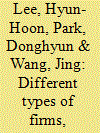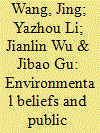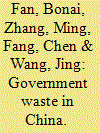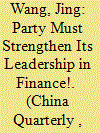|
|
|
Sort Order |
|
|
|
Items / Page
|
|
|
|
|
|
|
| Srl | Item |
| 1 |
ID:
120623


|
|
|
|
|
| Publication |
2013.
|
| Summary/Abstract |
Using highly disaggregated HS 8-digit product-category level data collected by the Chinese Customs Office for 2000 and 2008, we perform an in-depth anatomy of China's imports of manufactured goods. We estimate both the extensive margins - number of products imported per product group or trade partner - and intensive margins - amount of imports per product group or trade partner - of China's imports. Our paper contributes to the literature of firm heterogeneity in international trade in three different ways. First, we distinguish firms into foreign firms and domestic firms, which are further divided into private firms and public firms. Second, we distinguish products into final goods and intermediate goods. Third, we estimate gravity equations from the perspective of dynamics utilizing a dynamic adjustment model. Overall, our analysis yields a number of new stylized facts about China's imports. These, in turn, help us to gain a fuller understanding of China's trade patterns in light of its recent emergence as a globally significant importer.
|
|
|
|
|
|
|
|
|
|
|
|
|
|
|
|
| 2 |
ID:
171429


|
|
|
|
|
| Summary/Abstract |
Nuclear energy facility development in China has become controversial amid widespread environmental concerns. The present study examines how environmental beliefs influence public acceptance of nuclear energy in the context of China. In the current study, we test the mediation effect of nuclear engagement and test place attachment as a moderator based on cognitive-affective processing system theory. Our data have been obtained from an online survey, using a sample consisting of 516 individuals with experience in the public participation activities in Chinese nuclear power plant projects. The empirical results show that environmental beliefs are positively and significantly correlated to public acceptance of nuclear energy through the individuals’ nuclear engagement. Place attachment negatively and significantly moderates the direct impact of environmental beliefs on nuclear engagement. In the meantime, the mediating effect of nuclear engagement is weaker when place attachment is high. Significant practical implications are provided in our study for the Chinese governmental authorities.
|
|
|
|
|
|
|
|
|
|
|
|
|
|
|
|
| 3 |
ID:
098862


|
|
|
|
|
| Publication |
2010.
|
| Summary/Abstract |
The administrative expenditure of China has been growing rapidly in the past decades. This paper examines the forms and causes of government waste hidden in the high levels of administrative expenditure. Based on the findings, several specific policy suggestions are made.
|
|
|
|
|
|
|
|
|
|
|
|
|
|
|
|
| 4 |
ID:
065057


|
|
|
|
|
| Publication |
London, Routledge, 2005.
|
| Description |
xiii, 235p.
|
| Series |
Routledge Studies on China in Transition
|
| Standard Number |
0415366550
|
|
|
|
|
|
|
|
|
|
|
|
Copies: C:1/I:0,R:0,Q:0
Circulation
| Accession# | Call# | Current Location | Status | Policy | Location |
| 049978 | 306.0951090511/WAN 049978 | Main | On Shelf | General | |
|
|
|
|
| 5 |
ID:
181140


|
|
|
|
|
| Summary/Abstract |
This article examines the roles digital technologies have played in propelling the shifts in modes of financial governance which have been led by the Chinese Communist Party and enacted by a wide spectrum of regulative actors. Based on analyses of the laws, policies and regulations surrounding digital financial technologies, or so-called fintechs, as well as in-depth interviews with government officials and fintech business executives, I argue that the proliferation of fintechs challenged the existing regulatory schemes defined by the Central Bank and the State Council. This forced a reconsideration of the Chinese government's hegemonic strategies in governing the rapidly changing financial industries. While digital technologies have been promoted to accomplish the goals set by the Party for financial marketization and modernization, a set of institutions including regulatory, organizational and normative rules have been developed to strengthen the Party's control over the digitization of finance. This contradiction is pivotal to understanding the Party's financial policymaking in the digital age.
|
|
|
|
|
|
|
|
|
|
|
|
|
|
|
|
| 6 |
ID:
191308


|
|
|
|
|
| Summary/Abstract |
The debate between pollution reduction and job creation has been a relevant and practical topic, with ambiguous conclusions and expectations. This paper studies the impact of market-based environmental regulation on enterprise employment, taking the quasi-natural experiment of China's carbon emissions trading scheme (CETS). We develop the two-way fixed effects difference-in-differences method to evaluate the employment effect of the CETS, and use the data of listed companies in the manufacturing industry from 2011 to 2019 to provide evidence from China. We observe robust evidence that the CETS significantly expands the employment scale of cities and enterprises on the premise of achieving emission reductions, and that the employment promotion effect of the CETS on enterprises is driven by the application of robots. The output scale effect and productivity effect of robots promote employment, while the factor substitution effect inhibits employment, and the former is greater than the latter. Furthermore, robot application is complementary to low-skilled labor, but substitutes for medium-skilled labor.
|
|
|
|
|
|
|
|
|
|
|
|
|
|
|
|
|
|
|
|
|